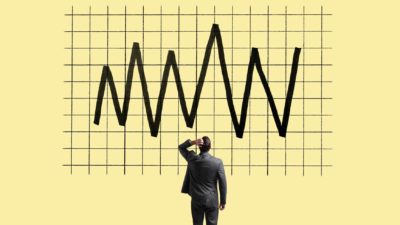Earlier this week, I wrote about the scourge of inflation, and the choice the RBA has to make between two bad options: more expensive mortgages and business loans or runaway inflation.
It's not a hard choice, actually, but the implications are serious for many people.
And adding higher loan repayments on top of already higher prices at the supermarket, petrol station and hardware store seems, well, cruel.
The problem is that we haven't had to deal with inflation for more than three decades.
There are 50 year-olds who haven't experienced inflation during their working lives.
Which is a problem, because humans aren't very good at learning old lessons, unfortunately.
Instinctively, we blow recent events out of all proportion, and we minimise the importance and seriousness of older ones.
It's why the phrase 'generals fighting the last war' should be one you keep top of mind.
"What if there's another pandemic" we're all asking, while other factors become bigger risks, unimagined.
Or, historically, we might point to the dramatic under preparedness of the Australian military in the late 1930s, or the Singaporean guns cemented in place, facing the wrong direction.
Many homebuyers in 2021 found it hard to contemplate a world with much higher inflation, and higher interest rates, but we're well and truly in the middle of the former and right on the cusp of the latter.
Which isn't to criticise anyone who made that mistake; as I said, our tendency to overemphasise the recent past at the expense of the more distant past is a failing we all share, thanks to our evolutionary biology.
But, here we are.
What now?
Well, I have a few thoughts.
If you're someone with cash in term deposits, you're probably going to (eventually, when the banks get around to passing higher rates on to savers!), earn a little more on your money. You're a winner from higher rates.
If you have a variable rate loan – mortgage, business loan, car loan or – god forbid – a margin loan, you're about to get slugged more.
If you have a fixed-rate loan, you're in the clear… for now. But remember, the housing crisis in the US that formed the early part of the GFC was caused by borrowers rolling off cheap fixed loans and onto more expensive variable loans that they suddenly couldn't afford. So start planning. Now.
If you're a borrower, here's another plea from me: please shop around. Make sure your bank is giving you the best rate out there.
If not, call your bank. Ask for a better rate.
If they won't give you one, switch banks (just be careful of exit and application fees in the process!).
Seriously, they don't deserve your loyalty if they won't give you the best rate out there.
If you want to donate money to a good cause, trust me when I say there are hundreds of better causes than your bank!
Here's the other thing I want you to do.
Google 'home loan calculator' – ASIC's 'Money Smart' website has a good one – and work out how much more you'll pay when (not if!) rates go up.
Then start paying that increased rate, now.
Or, at the very least, work out where the extra money will come from.
And if you can't afford it? Make two calls, today.
Call your bank, and ask them what options are available.
Then call a financial counsellor. No, not one of those debt consolidation mobs. A fair dinkum low- or no-fee financial counsellor who has nothing to sell, and really wants to help.
If your financial life is about to get very tight, acting now, and asking the right people, will give you the best possible chance of getting the best outcome.
(I can't promise it'll be a perfect outcome; you might need to hear some home truths and make some tough decisions, but doing it before things get ugly gives you time, space and likely leads to a better result.)
And what about for investors? What's the impact of higher inflation and higher interest rates?
Here's where it gets trickier.
By the way, I was (politely) asked if I was ducking this issue in my last missive on the inflation and interest rates topic, to somehow protect The Motley Fool's business.
It was a fair, if somewhat cynical question. But in case you were wondering, the answer is a very firm no.
"No", because that's not what we do, here.
"No", because even if I wanted to (I don't), there's no escaping the impact, and pretending it didn't exist is the sort of 'kicking the can down the road' stuff I hate.
And, frankly, "no", because, given the answers, above, even if I was cravenly trying to just look out for The Motley Fool's business over the interests of our readers, I'd actually do just what I've done – speak plainly and clearly about the issue, to prepare them for what's to come!
It's the beauty of being a membership-based business – next year's sales and profits only turn up if we do our job well, and our members hang around.
That sort of model aligns our interests with yours, about as perfectly as possible.
Anyway, back to the question of the impact on investors.
It's been a while since one of these 'macro' factors has been important when it comes to choosing which companies to invest in.
Yes, the gold price matters for gold miners, and almost no-one else. Ditto the oil price. And yes, the growth or decline of, for example, China, matters to some industries more than others.
But when a really important economic lever – namely interest rates – starts to move upward for the first time in 15 years, on the back of the first real rise in inflation for 30 years… well, it's a good time to think about which companies stand to be impacted, positively and negatively.
(And, spoiler alert: there's one even bigger factor that you need to think about, too. That's coming in a bit, so stay tuned.)
Who stands to gain from higher rates?
Well, not many companies. Banks might do well, if they can use higher rates to fatten their margins, but only if there aren't meaningful mortgage and business loan defaults.
Insurers who invest their premiums in cash and bonds will get a higher return on that money. Ditto businesses like Computershare Limited (ASX: CPU), that holds cash in transit between companies and shareholders, for example.
Others? Not many. Which makes sense: Higher rates are supposed to suppress economic activity, so it stands to reason that more lose than win from higher rates.
And the losers?
Well, it depends on how far down the rabbit hole we go.
First, companies with a lot of debt, whose interest bills will rise, probably meaningfully, hurting margins. Be careful of those companies. Profits will get hit. So will share prices. In a worst case scenario, some might even collapse under the weight of suddenly more expensive debt.
Second, companies with little pricing power. Imagine you're a miner, who sells your commodity at the prevailing global price. Now imagine your costs of staff, fuel and other expenses go up. You can't pass on those higher costs, so your profits are going to suffer.
Third, if interest rates do bite, discretionary economic activity will likely be somewhat curtailed. If your business sells products that are in that area, you should expect demand to be lower than it otherwise would have been (but the results will vary dramatically, depending on what you sell, to whom, and how much they want it!)
And the spoiler I promised?
Here's where investing gets just a little harder.
Let's say you know all of the stuff I wrote above. Maybe you already knew it, or maybe you know it now you've read it.
Guess what: Everyone else does now, too.
And if everyone else knows it, it might already be reflected in share prices.
Let's say my company's shares were $10 a short 12 months ago, and are now $5, because the market is fearful of higher inflation and higher rates.
If the impact on the company is only moderate, the shares might be cheap, even though future profits will be a little lower!
That's the problem with investing (and the enjoyment for those of us who appreciate the challenge); you have to think about two things at once: what the business might do, and whether the shares are expensive, cheap or just about right, based on that outlook.
A company with a very bright future can be hugely overvalued.
A company with a poor outlook can be cheap as chips.
Or completely the other way around!
And that's how it must be – if it was able to be simply programmed into a computer using some simple rules, there'd be no gains on offer.
(And don't forget, you can be right over the long term, but wrong for a long time in between. I told you it was hard!)
So, what's an investor to do?
Here's my tip:
If in doubt, buy quality companies. Because even if you end up paying a little too much, you're unlikely to get wiped out.
On the other hand, if you're trying to be too clever – aiming to find some speculative miner, biotech or 'hot stock', you might make a few bob… or be taken to the cleaners. Ditto some 'deep value' thing that turns out to be a value trap.
That's not to say you can't possibly make money in those last two areas… but it requires more experience, skill, and frankly a lot more luck, that many investors possess.
And my last piece of advice:
Remember that the so-called smart money doesn't know, either.
In the last 10 trading days, the most-followed US stock market index, the S&P 500, has moved by more than 1% on six different days.
On three of those days, the move was more than 2.4% – in different directions!
Does that sound like the 'smart money', or a group of headless chooks?
And yet, over the long term, the stock market, there and here, has averaged 9 – 11% per annum.
And yes, through periods of high and low inflation, high and low interest rates, as well as booms, busts, war, peace and everything else humanity has been up to over the past 120-odd years.
Which kinda puts it all into perspective, huh?
Things might be about to get bumpy. Or not.
There's never been a better time to double our focus on what matters, and to screen out the stuff that doesn't.
Play your game, not theirs. Keep your eyes fixed firmly on the long term.
Fool on!









